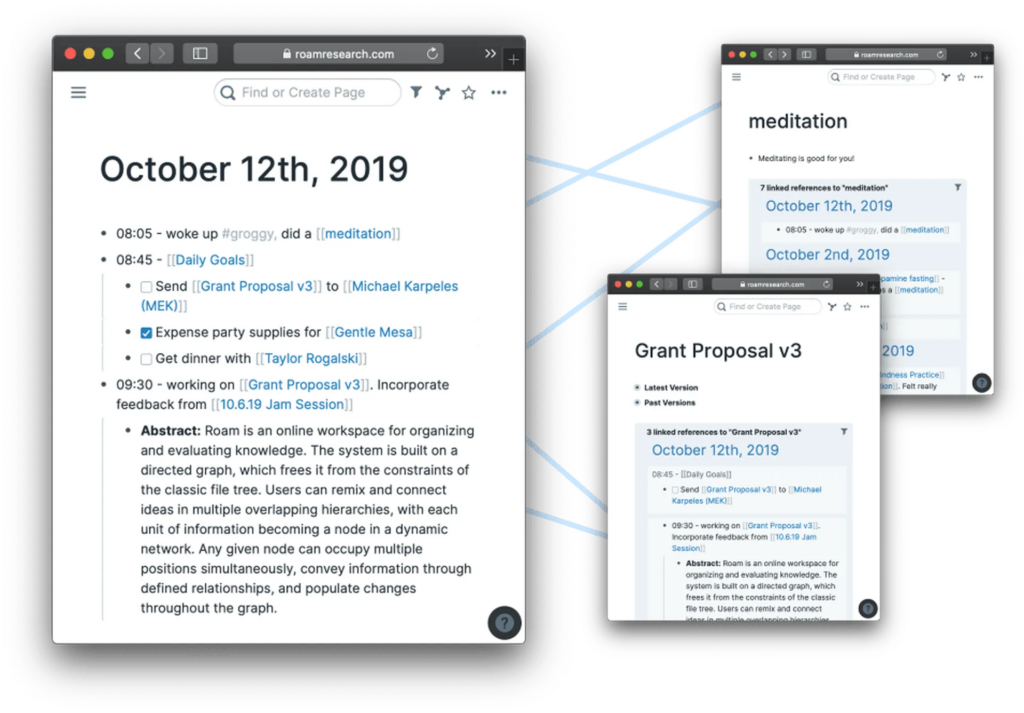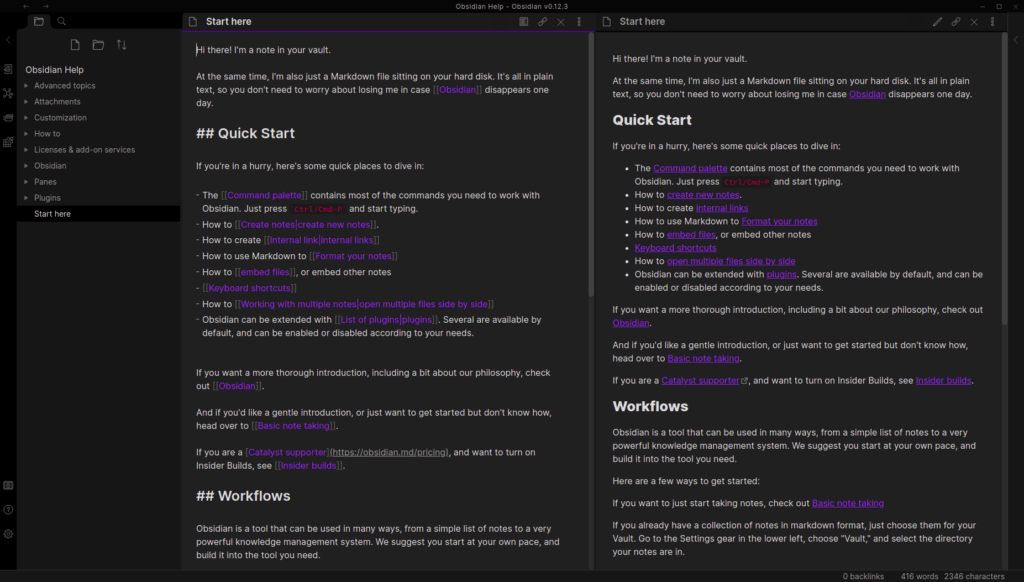If you’ve been following Redeeming Productivity for a few years, you’ll know I was entirely on board the hype train of “connected note-taking apps” around 2020. But I have to admit my affection for these apps has waned over time. And I wanted to share some thoughts on what I see as the main problem with the way many of us use these apps.
So, I was an early adopter of Roam Research, the note-taking tool that set off a sort of note-taking app revolution around 2019/2020. I did podcast episodes on taking smart notes and several videos on using Roam Research (and its relatives like Obsidian and Logseq) for things like Bible study, research, and writing.
I say all that just to point out that I have benefited from and continue to benefit from connected note-taking apps. Despite the title, this is not an article that is critical of the apps themselves or declaring them useless. But as a devoted user of these apps, I have to admit some of the shine has worn off for me. And this week as I read Casey Newton’s “Why note-taking apps don’t make us smarter,” I found myself nodding along to his critiques.
The truth is the promise of connected note-taking apps has largely fallen flat.

The Promise of Effortless Output
When I say “connected note-taking apps,” I’m speaking specifically of apps built around the concept of creating “knowledge graphs.” Traditional note-taking apps are skeuomorphic by design; they translate what we know from physical notebooks into a digital space.
Take Apple Notes, for example. You use notes, notebooks, and perhaps tags. But in terms of organizing, it’s just a software version of a Trapper Keeper or a stack of physical notebooks.
But this new generation of note-taking apps introduced another form of connection called bidirectional links. Bidirectional links enabled users to create a dynamic network between notes that transcended projects, notebooks, and other organizing systems. It was a less hierarchical, more organic way to organize. The promise was that by creating these connections in your note-taking app, you could effectively discover connections in your own thinking you’d never notice on your own. You were creating a second brain.

One of the first online courses designed to help users capitalize on this note-taking revolution was a course on Roam Research by Nat Eliason titled Effortless Output. While it was a good resource for learning the basics of using Roam, the title perfectly summarizes the implicit promise of this new way of taking notes: By writing little notes and linking them together, you can effortlessly produce worthwhile output.
And while there are many great things to be gleaned from these systems and apps, there’s one big problem: There is no such thing as effortless output.
Connected note-taking apps, while helpful, promise something that is simply not possible. And it’s only when you let go of that illusion that you’ll actually be able to use these apps effectively without them getting in the way of the actual, good, old-fashioned thinking.
What Software Can Never Do
Another popular moniker for connected note-taking apps is “tools for thought.” There are whole groups online dedicated to TfTs. You can learn tips for setting up Obsidian to your taste, importing your notes between programs, and creating advanced queries in Tana.
But as Newton points out, these apps can’t make us smarter. They can’t help us think. They might aid us in saving and recalling information, but when it comes to thinking, they get in the way more often.
“Note-taking, after all, does not take place in a vacuum. It takes place on your computer, next to email, and Slack, and Discord, and iMessage, and the text-based social network of your choosing. In the era of alt-tabbing between these and other apps, our ability to build knowledge and draw connections is permanently challenged by what might be our ultimately futile efforts to multitask.”
Casey Newton, “Why note-taking apps don’t make us smarter”
Distraction is certainly a massive hindrance here. But as Christians, we have an even deeper insight into the problem these apps are trying to overcome and the futility of trying to make thinking and creating effortless.
Why do we desire tools for thinking? Because we recognize the limits of our ability to think.
We struggle to retain information and synthesize it. This makes knowledge work, like all work, frustratingly difficult at times. So, naturally, the promise that an app could make all of the knowledge worker’s frustrations evaporate is massively alluring. But while tools can help with many knowledge tasks, software can never make you smarter. It can’t make you think better.
The reason is that we’re living in a cursed world. God’s Word makes that clear in Genesis 3. While it’s true that technology has indeed made us more productive in many ways, believers need to be careful of the promises of the technologist’s utopian vision of a world without toil this side of heaven.

In His providence, God has worked through men and women to create technologies that alleviate some of the symptoms of the curse. The epidural greatly reduces the woman’s pain in childbearing, for example. But it certainly doesn’t eliminate it or reverse the curse on women (Genesis 3:16). Likewise, labor-saving technologies reduce the pain of the curse on work to some degree (Genesis 3:17–19). But we’d be foolish to think technology can ever fully alleviate the curse. That will only happen when Christ returns (Revelation 22:3). It’s this that we, along with the rest of creation, are eagerly groaning for (Romans 8:18–23).
Every week, people email me to ask what app or system they should use to finally get organized and productive. The hunt for the perfect productivity system is an obsession for us productivity nerds. But part of the reason our quest never seems to pan out, and we’re always moving onto a new system or app, is because we are trying to solve a problem that can’t be solved with technology.
We have unknowingly imbibed the philosophy of technological progressivism: We think that because technology has relieved some of man’s problems, it will eventually relieve all of our problems. But that is not the Christian view.
Technology, while helpful, is not our Savior; Jesus Christ is. Software cannot lift the curse, it cannot countermand the noetic effects of sin, and it can’t redeem the futility of our work. Looking to technology to reverse the curse is a fool’s errand at best and idolatry at worst.
Thinking Doesn’t Happen on a Computer
The first computer our family ever owned ran MS-DOS. But as a kid, it seemed pretty useless to me. That is until my mom picked up a few computer games at a trade show. They came on those massive 5 1/4″ floppy disks.
Since I didn’t know how to use the computer, I’d have to ask my mom to set it up for me if I wanted to play Commander Keen. But the computer always froze while the game was loading. No progress indicator, just an hourglass cursor. It would hang there for what felt like hours. I’d complain, “Why isn’t it working?” And my mom would always answer the same way, “The computer is thinking.”
But it wasn’t thinking.
Computers don’t think; they process. And before you start babbling to me about how “AI is going to change the world, man,” I think we can all at least agree that even the most advanced neural network doesn’t think the way we think.
My point is simply that thinking, real thinking, cannot be outsourced to a computer or a note-taking app. And to put an even finer point on it, I don’t believe thinking, as such, can even be significantly aided by technology.

While there is something to be said for getting ideas out of your head so you can move them around in a visual space, my experience has been that an over-reliance on “tools for thinking” instead of helping my thinking, mostly just stunts it.
Again, I appreciated Newton’s on this point.
“The reason, sadly, is that thinking takes place in your brain. And thinking is an active pursuit — one that often happens when you are spending long stretches of time staring into space, then writing a bit, and then staring into space a bit more. It’s here here that the connections are made and the insights are formed. And it is a process that stubbornly resists automation.”
Casey Newton, “Why note-taking apps don’t make us smarter”
There are many things a computer can help us do, but thinking is not one of them. Nor is it one we really want the computers to do, AI enthusiasm notwithstanding. Thinking is a uniquely human activity. To augment thinking with technology, therefore, is not to improve it but to diminish it.
How Note-Taking Apps Can Help
I still use Logseq every day to capture ideas, highlights, and thoughts I can retrieve later. I still organize it and make new connections. But my mentality toward connected note-taking apps has changed. I used to talk about my note-taking system as a partner in thinking. But I don’t use that language anymore.
Opening Roam, Obsidian, Logseq, or Notion: making new connections, moving things around, writing a bit, organizing a bit, or jotting a new note can be useful and enjoyable. And it can help you with your research, writing, and productivity, certainly. But I’ve come to realize that “tending my knowledge garden” is not where the real output comes from. Real, useful output is far from effortless. It’s the product of the always-difficult, sin-cursed, yet still highly rewarding work of thinking.
As such, I’ve had to train myself to actively resist the urge to open a note on my computer and start writing when the ideas start to flow. I know there’s that famous David McCullough quote that says, “Writing is thinking.” But that’s not strictly true. Writing is clarifying your thinking. Cognition precedes keystroke. Therefore, writing isn’t thinking; thinking is thinking. You think before you write. You pause from writing to think more. They are overlapping activities, but they are yet distinct. And you don’t need to be at a computer to think. In fact, I’m arguing you’re more likely to do your best thinking away from the computer.

We live in the age of the so-called “knowledge worker.” And knowledge work is most certainly aided by computers and note-taking technology. But somewhere along the line, we got brainwashed into believing that work = working on a computer. Maybe it was the expectation of our employers that created the false equivalence. After all, to a manager, if you aren’t at your desk, you must not be working. But if it’s really knowledge work, that ought to mean a lot of thinking. And as we’ve established, the computer isn’t much help in that department.
I’ve discovered the longer I can force myself to marinate on an idea, either by taking long walks, driving in silence, or staring up at the ceiling, the clearer the idea gets. Eventually, the concepts bubble over and force themselves out onto a page—usually paper at first. Only then do I have the raw material to take to the note-taking app for processing, connecting to other ideas, and research. It’s at this point that the tools are genuinely helpful.
I’ve made a game out of it: How far can I take an idea in my mind or on paper before I will actually benefit from my computer’s processing power? What’s been interesting is that I’ve found my thinking has been more aided by resisting the use of software tools for as long as possible rather than running to them right away.
In summary, your note-taking app is a tool for writing. It’s a tool for researching. But it’s not a tool for thinking. Because computers are for processing, not for thinking, and the more honest we are about that distinction, the more our thinking and our work will improve. It won’t be effortless, but I’m confident the output will be better.

